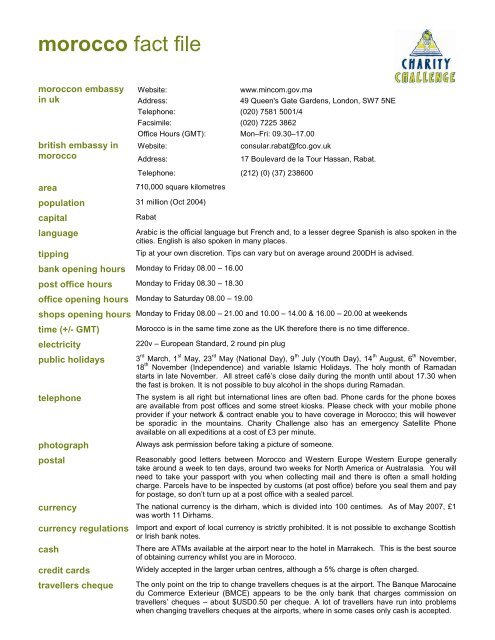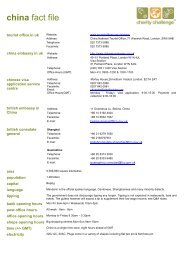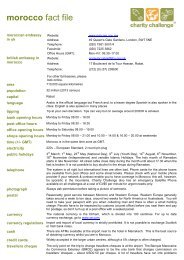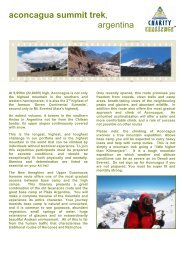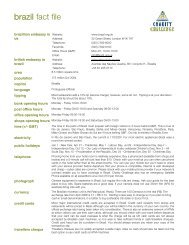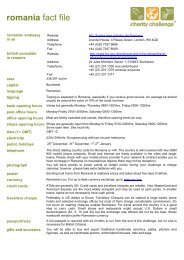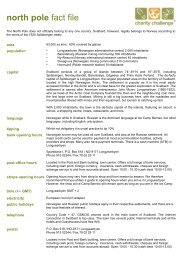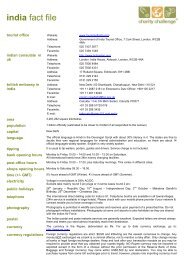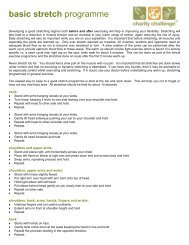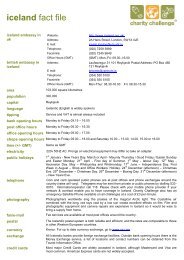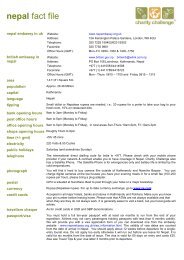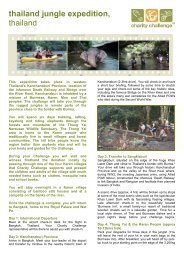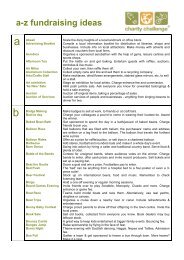morocco fact file - Charity Challenge
morocco fact file - Charity Challenge
morocco fact file - Charity Challenge
- No tags were found...
You also want an ePaper? Increase the reach of your titles
YUMPU automatically turns print PDFs into web optimized ePapers that Google loves.
<strong>morocco</strong> <strong>fact</strong> <strong>file</strong><br />
<strong>morocco</strong>n embassy<br />
in uk<br />
british embassy in<br />
<strong>morocco</strong><br />
Website:<br />
www.mincom.gov.ma<br />
Address:<br />
49 Queen's Gate Gardens, London, SW7 5NE<br />
Telephone: (020) 7581 5001/4<br />
Facsimile: (020) 7225 3862<br />
Office Hours (GMT): Mon–Fri: 09.30–17.00<br />
Website:<br />
consular.rabat@fco.gov.uk<br />
Address:<br />
17 Boulevard de la Tour Hassan, Rabat.<br />
Telephone: (212) (0) (37) 238600<br />
area<br />
710,000 square kilometres<br />
population 31 million (Oct 2004)<br />
capital<br />
language<br />
tipping<br />
Rabat<br />
Arabic is the official language but French and, to a lesser degree Spanish is also spoken in the<br />
cities. English is also spoken in many places.<br />
Tip at your own discretion. Tips can vary but on average around 200DH is advised.<br />
bank opening hours Monday to Friday 08.00 – 16.00<br />
post office hours Monday to Friday 08.30 – 18.30<br />
office opening hours Monday to Saturday 08.00 – 19.00<br />
shops opening hours Monday to Friday 08.00 – 21.00 and 10.00 – 14.00 & 16.00 – 20.00 at weekends<br />
time (+/- GMT)<br />
electricity<br />
Morocco is in the same time zone as the UK therefore there is no time difference.<br />
220v – European Standard, 2 round pin plug<br />
public holidays<br />
telephone<br />
photograph<br />
postal<br />
3 rd March, 1 st May, 23 rd May (National Day), 9 th July (Youth Day), 14 th August, 6 th November,<br />
18 th November (Independence) and variable Islamic Holidays. The holy month of Ramadan<br />
starts in late November. All street café’s close daily during the month until about 17.30 when<br />
the fast is broken. It is not possible to buy alcohol in the shops during Ramadan.<br />
The system is all right but international lines are often bad. Phone cards for the phone boxes<br />
are available from post offices and some street kiosks. Please check with your mobile phone<br />
provider if your network & contract enable you to have coverage in Morocco; this will however<br />
be sporadic in the mountains. <strong>Charity</strong> <strong>Challenge</strong> also has an emergency Satellite Phone<br />
available on all expeditions at a cost of £3 per minute.<br />
Always ask permission before taking a picture of someone.<br />
Reasonably good letters between Morocco and Western Europe Western Europe generally<br />
take around a week to ten days, around two weeks for North America or Australasia. You will<br />
need to take your passport with you when collecting mail and there is often a small holding<br />
charge. Parcels have to be inspected by customs (at post office) before you seal them and pay<br />
for postage, so don’t turn up at a post office with a sealed parcel.<br />
currency The national currency is the dirham, which is divided into 100 centimes. As of May 2007, £1<br />
was worth 11 Dirhams.<br />
currency regulations Import and export of local currency is strictly prohibited. It is not possible to exchange Scottish<br />
or Irish bank notes.<br />
cash<br />
credit cards<br />
travellers cheque<br />
There are ATMs available at the airport near to the hotel in Marrakech. This is the best source<br />
of obtaining currency whilst you are in Morocco.<br />
Widely accepted in the larger urban centres, although a 5% charge is often charged.<br />
The only point on the trip to change travellers cheques is at the airport. The Banque Marocaine<br />
du Commerce Exterieur (BMCE) appears to be the only bank that charges commission on<br />
travellers’ cheques – about $USD0.50 per cheque. A lot of travellers have run into problems<br />
when changing travellers cheques at the airports, where in some cases only cash is accepted.
passport/visa<br />
gifts and souvenirs<br />
vaccination and<br />
health<br />
risks<br />
A full passport is required but no Visa. You must have at least six months to run on your<br />
passport from the end of the expedition. Ensure your passport is stamped on arrival. Also see<br />
Travel Tips.<br />
For centuries, Moroccan crafts have been world-famous for their variety and quality. The best<br />
thing to remember is that hard bargaining is essential.<br />
Nomad Travel Stores Medical Centre recommended the following vaccinations: tetanus;<br />
poliomyelitis; hepatitis A. They also suggest taking advice from your GP about: typhoid;<br />
diphtheria; hepatitis B; rabies; tuberculosis. The risk of malaria is limited to eastern parts of the<br />
country in rural valleys, west of the Atlas mountains (Al Hoceima, Taounate and Taza<br />
provinces) from May-October. Malaria precautions are essential. Avoid mosquito bites by<br />
covering up with clothing such as long sleeves and long trousers especially after sunset, using<br />
insect repellents on exposed skin and, when necessary, sleeping under a mosquito net. Please<br />
consult your GP or local travel clinic. Also see Health notes.<br />
Crime is not a major problem in Morocco, but it is growing. Visitors should avoid streets in<br />
badly lit or run-down areas late at night if unaccompanied. Visitors should ensure that when<br />
entering the country that their passports are stamped. Some tourists have experienced<br />
difficulties leaving the country because their passports bear no entry stamp.<br />
hospitals/pharmacies Hospitals exist in all major cities and pharmacies can be found in many smaller towns and<br />
villages.<br />
water<br />
climate<br />
temperature<br />
geography<br />
culture/customs<br />
Water will be provided for you whilst you are trekking however if you want extra, always<br />
sterilise drinking water or buy bottled water. Also see Health notes.<br />
Winter in the higher regions demands clothing suitable for Arctic conditions; this is true of<br />
anywhere in the vicinity of the High Atlas. In summer, it’s hot during the day and cool at night.<br />
Also see Q&A’s for your chosen expedition.<br />
In the winter the lowlands are pleasantly warm to hot (around 30c) during the day and cool to<br />
cold (around 15c) at night. In summer, it’s very hot during the day (around 45c) and<br />
uncomfortably warm at night (around 23c).<br />
One of Africa’s most geographically diverse and spectacularly beautiful countries. The country<br />
is covered by four distinct ranges of mountains: the Rif, Middle Atlas, High Atlas and Anti Atlas.<br />
Punctuated by large eroded gorges, which peter out to the endless sands and stony wastes of<br />
the Sahara desert.<br />
A fascinating mixture of Arab, African, Islamic, Berber and European cultures, customs and<br />
beliefs.<br />
do’s & don’ts • Do avoid large gatherings, do not be provocative and keep a low pro<strong>file</strong>.<br />
• Do report incidents to the nearest police station.<br />
• Do not carry a Bible in Arabic, attempt to distribute any evangelical literature or be involved<br />
in any such activity.<br />
• Do minimise hassle; women will attract attention; dress modestly and avoid wearing short<br />
skirts and low-necked strappy tops (other than on the beach).<br />
• Do bring enough funds for your stay and your return. Bank transfers can take up to six<br />
weeks and if you miss your return charter flight you may need to buy another ticket.<br />
• Do take care of your belongings at all times. Carry your passport with you, take a<br />
photocopy of it and leave it somewhere safe; avoid carrying too much cash. Traveller’s<br />
cheques are safer.<br />
• Do beware of con men, although shopping is a great experience it can involve a lot of<br />
haggling.<br />
• Don’t get involved with drugs. The penalties for possession of even small amounts of drugs<br />
are severe: up to 10 years’ imprisonment with no remission for good behaviour.


